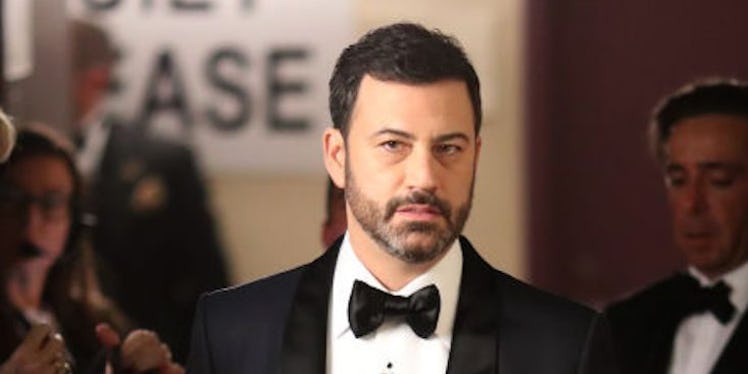
Jimmy Kimmel Criticism Is Wrong, But Makes A Good Point About Political Convos
When Jimmy Kimmel tearfully discussed his son's open-heart surgery and concluded that no parent should have to struggle to cover their child's pre-existing conditions, he posed a rhetorical question.
Kimmel asked,
If your baby is going to die, and it doesn't have to, it shouldn't matter how much money you make. I think that's something that -- whether you're a Republican or a Democrat or something else -- we all agree on that, right?
It's clear now that the answer is no.
Not everyone is reacting to Kimmel's unusually sad story with sympathy and support. In fact, Kimmel has received some criticism for the way he delivered the story.
The most notable critique came on Tuesday night, when CNN contributor and Daily Beast columnist Matt Lewis called Kimmel's monologue "cheap."
During an airing of "AC 360," Lewis said,
I completely understand where Jimmy Kimmel is coming from, the passion I think is sincere. I don't think that this is the right move for him to do to politicize this. This is a guy who is incredibly rich. Of course he's not going to have a problem.
Lewis' co-panelists protest, and with good reason.
The implication that Kimmel's words should carry less weight, merely because he happens to be a millionaire, is unfair.
Kimmel even went out of his way to point out that families less fortunate than his might not have been able to survive such a traumatic episode.
In some ways, actually, it felt like Lewis' frustration with Kimmel's monologue was a bit misplaced, especially when the conservative commentator remarked -- with sarcasm -- that he doesn't tune into a comedian's show for moral points.
Lewis, it seemed, was criticizing Kimmel as just another out-of-touch liberal Hollywood star talking bringing politics into a space it doesn't belong.
The general tone of the criticism was no different than the flak Meryl Streep received for her speech at the Golden Globes.
The problem, though, is that Kimmel's speech was different. Unfortunately, Kimmel is very much in-touch when it comes to have child facing a life-threatening condition.
So, at the very least, you might think the late night star would be given the benefit, even by opponents of universal healthcare, conservative writer David French.
Now that all that's been said, though, we'd be remiss to not acknowledge the obvious truth.
Kimmel absolutely did introduce politics in his monologue about the tragic experience his family went through.
That is not meant to be a criticism, mind you, nor set up some kind of rebuttal. It's just a matter-of-fact truth.
Here's another matter-of-fact truth: Kimmel's monologue swayed political discussion -- and drew reactions from politicians -- at a time when Congress is debating health reform.
These news stories are proof of that.
Acknowledging these facts makes it a bit easier to understand why the criticism of Kimmel exists in the first.
Regardless of how noble Kimmel's cause is, it is ultimately a personal story that aims tip the balance of a debate over which healthcare laws are put into place.
Away from the cameras of CNN, Lewis did a better job of making that exact point on Twitter (in spite of the unnecessary mention of Kimmel's fame).
There, he has a point, one that you might appreciate if you consider it from another angle.
There are sure to be many who applauded Kimmel's monologue but detest the way Donald Trump, while trying to rally support for his immigration policies, highlights the stories of victims of crimes committed by immigrants.
Few people would doubt that the families' pain is real. But whether the reality of their pain should sway policy is debatable.
And that's the thing about individual stories. Everyone has them, and, in the worst cases, they can be manipulated. That's why it's understandable why some might be tempted to react to Kimmel's monologue with support.
Regardless of whether we agree or disagree with Kimmel's ultimate point, we can acknowledge the potential dangers of giving personal stories power in politics. Most importantly, though, we can make that acknowledgement without being disrespectful or withholding sympathy.